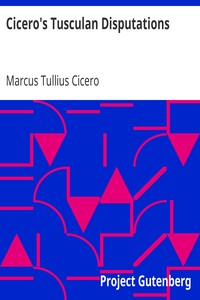Cicero's Tusculan Disputations by Marcus Tullius Cicero
"Cicero's Tusculan Disputations" by Marcus Tullius Cicero is a philosophical treatise written in the late Roman Republic period. This work presents a series of five dialogues in which Cicero addresses various philosophical questions concerning the nature of death, the essence of happiness, and the role of virtue in life. The primary focus is to provide a philosophical framework to help individuals confront and understand their anxieties surrounding death and suffering. The opening
of the text introduces the context of its creation, highlighting Cicero's personal grief due to the death of his daughter, Tullia, which prompted him to seek solace in philosophical discussions. In the first book, Cicero, engaging in a dialogue with friends, begins to tackle the fear of death. He argues that death should not be perceived as an evil and explores their underlying beliefs about life, existence, and morality. Cicero employs rhetorical questioning to challenge and refine his arguments, inviting his participants to reconsider their assumptions about mortality and the nature of human suffering. This engaging discursive style sets the stage for further exploration of fundamental philosophical concepts throughout the subsequent dialogues. (This is an automatically generated summary.)
Read or download for free
| How to read | Url | Size | |||
|---|---|---|---|---|---|
| Read now! | https://www.gutenberg.org/ebooks/14988.html.images | 1.1 MB | |||
| EPUB3 (E-readers incl. Send-to-Kindle) | https://www.gutenberg.org/ebooks/14988.epub3.images | 497 kB | |||
| EPUB (older E-readers) | https://www.gutenberg.org/ebooks/14988.epub.images | 518 kB | |||
| EPUB (no images, older E-readers) | https://www.gutenberg.org/ebooks/14988.epub.noimages | 504 kB | |||
| Kindle | https://www.gutenberg.org/ebooks/14988.kf8.images | 932 kB | |||
| older Kindles | https://www.gutenberg.org/ebooks/14988.kindle.images | 896 kB | |||
| Plain Text UTF-8 | https://www.gutenberg.org/ebooks/14988.txt.utf-8 | 1.0 MB | |||
| Download HTML (zip) | https://www.gutenberg.org/cache/epub/14988/pg14988-h.zip | 485 kB | |||
| There may be more files related to this item. | |||||
Similar Books
About this eBook
| Author | Cicero, Marcus Tullius, 107 BCE-44 BCE |
|---|---|
| Translator | Yonge, Charles Duke, 1812-1891 |
| Title |
Cicero's Tusculan Disputations Also, Treatises On The Nature Of The Gods, And On The Commonwealth |
| Note | Wikipedia page about this book: https://en.wikipedia.org/wiki/Tusculanae_Disputationes |
| Note | Reading ease score: 57.3 (10th to 12th grade). Somewhat difficult to read. |
| Credits |
Produced by Ted Garvin, Hagen von Eitzen and the PG Online Distributed Proofreading Team. |
| Language | English |
| LoC Class | PA: Language and Literatures: Classical Languages and Literature |
| Subject | Theology -- Early works to 1800 |
| Subject | Political science -- Early works to 1800 |
| Subject | State, The -- Early works to 1800 |
| Subject | Happiness -- Early works to 1800 |
| Subject | Gods, Roman -- Early works to 1800 |
| Subject | Rome -- Politics and government -- 265-30 B.C. |
| Category | Text |
| EBook-No. | 14988 |
| Release Date | Feb 9, 2005 |
| Most Recently Updated | Dec 19, 2020 |
| Copyright Status | Public domain in the USA. |
| Downloads | 2749 downloads in the last 30 days. |
| Project Gutenberg eBooks are always free! | |

